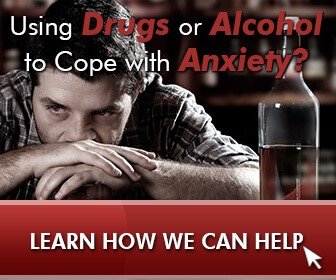Studies show that anxiety is on the rise among young adults, and this could have a direct effect on their substance abuse patterns. Addressing anxiety is a crucial component of treating addiction – learn more here.

Sharelines
- Your son’s addictive behaviour could be fuelled by an anxiety disorder.
- Your son’s addictive behaviour could be fuelled by an anxiety disorder.
Anxiety is common among young adults. But for some, the level of day-to-day anxiety they experience is more than they’re capable of dealing with. No parent wants to see their child suffering from chronic anxiety, but what you may not realise is that mental health disorders like this can also fuel addiction. Given the recent rise in anxiety disorders among teens, this is a particularly serious area of concern.
Research is revealing a rising epidemic of anxiety disorders among children and teens, and in many cases, this is paving the way to addiction in early adulthood. In this post, we’ll explore these trends in greater detail, offering insight into how anxiety can drive the development of an addiction. We’ll also consider what you, as a parent, can do to help your child overcome these early challenges.
In other words, if your son is struggling with substance abuse, treating his addiction may also require treating his anxiety. But before we explore emerging trends of teenage anxiety, let’s consider the relationship between anxiety and addiction.
How Anxiety Leads to Addiction in Young Adults
Everyone feels anxiety at some point or another. Indeed, there are plenty of situations in which this is a valid and even helpful response to stress stimuli. However, those in the clutches of an anxiety disorder are no longer receiving these potential benefits. Instead, they find themselves plagued by fear and worry, unable to function normally.
For a person suffering like this, substance use and abuse can bring about temporary relief. This is a welcome result, to say the least, and it ultimately serves to reinforce the addictive behaviour. This is because the substance triggers the brain’s reward centre, building new neuropathways (i.e. brain circuits) connecting the substance use to decreased anxiety.
With this in mind, someone who already struggles with addiction may see their disease intensified and strengthened through bouts of severe anxiety. But even those with no history of substance abuse could still be at greater risk of developing an addiction if they already suffer from an anxiety disorder.
In this sense, anxiety and addiction feed into one another. This is actually a common addiction-related phenomenon known as co-occurring disorders. Patients who struggle with addiction also commonly suffer from mental illnesses such as anxiety, depression or borderline personality disorder.
It’s worth noting that, for young people with co-occurring disorders, both the addiction and the mental illness must be treated. This is the only way for them to enter into a healthy recovery; failing to do so could leave them with unaddressed relapse triggers.
Anxiety Among Youth is on the Rise
Studies have found that roughly one in four 13- to 18-year-olds suffer from mild to moderate anxiety. Research also tells us that symptoms of anxiety disorder typically emerge at about 11 years of age and then intensify from there. In teenagers, anxiety often also overlaps with depression.
For those gripped by chronic anxiety, it can be difficult to objectively identify the symptoms. But parents will see them. The following symptoms are often present:
- Physical weakness
- Muscle tension
- Poor memory
- Nagging worry
- Shortness of breath
- Palpations
- Sweaty hands
- Confusion
- Difficulty concentrating
- Upset stomach
If you notice any combination of the above symptoms in your teen, then they could be suffering from an emerging anxiety disorder. It’s essential to seek a diagnosis and help them find the treatment they need as early in their development as possible.
How to Treat Anxiety in Young People
Research shows us that therapy is the most consistently successful treatment option for anxiety. Cognitive behavioural therapy (CBT) is one of the most common types of therapy applied. In fact, we use CBT at The Edge to treat our young patients.
CBT has been viewed as a successful form of treatment young people. One study found that around two-thirds of children who are treated with CBT will be free of their anxiety disorder when treatment concludes. Furthermore, the American Psychological Task Force on Psychological Interventions has clearly concluded that CBT is effective in treating anxiety in young people.
The Edge Specialises in Co-occurring Addiction and Anxiety Treatment for Young Men
At The Edge Rehab, we specialise in helping young men overcome addiction and set a trajectory for a happier, healthier adult life. We accomplish this through a combination of CBT, physical fitness and mindfulness training. As a result, the young men entrusted to our care learn how to cope with stress, set ambitious personal goals and take control of their lives.
While our rehab programme focuses on treating the disease of addiction, our treatment specialists are accustomed to working with patients who have co-occurring disorders. As CBT is one of our primary treatment tools, we’re also able to help our patients develop tools and strategies for overcoming mental health issues such as anxiety disorder.
Our programme’s success hinges on its ability to treat the entire person. If your son’s anxiety is tied up in his struggle with addiction, we can help him unravel these disorders and gain a clearer perspective. By the time he leaves The Edge, he will be equipped to embrace recovery and enjoy sounder state of mind. Get in touch with us through our website and let us call you to explain more about how our treatment programme works.





